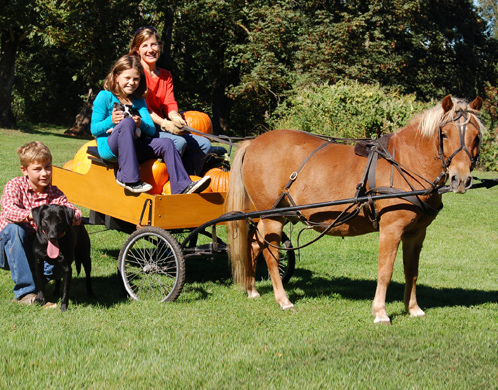 Beacon Avenue South is a major, trafficked street. Still, it doesn’t surprise Lisa Sferra, M.D. ’97, Res. ’99, to find someone parked on the side of the road near her property. It happens fairly regularly. One passerby told her, wistfully, “This looks like the place I grew up in Laos.”
Beacon Avenue South is a major, trafficked street. Still, it doesn’t surprise Lisa Sferra, M.D. ’97, Res. ’99, to find someone parked on the side of the road near her property. It happens fairly regularly. One passerby told her, wistfully, “This looks like the place I grew up in Laos.”
Why do people stop and look? Sferra’s property isn’t what you’d expect within Seattle city limits. It’s not a house with a bit of yard. Rather, it’s acres of grass, trees, fences and horses called Seattle Farm. And it’s been in Sferra’s family for 99 years.
Truthfully, it may be a bit of a misnomer to call it a farm. It might be more accurate to call it an equestrian paradise; kids learn how to ride and jump, and Sferra and her family board horses.
“All the women in my family are completely horse-addicted,” Sferra says. When she was 13, for example, she spent the night in the barn with a pregnant mare, helping birth her foal. As a youngster, she took care of all the farm’s sick horses.
All in all, it was pretty good preparation for medical school. Today, Sferra works on call for the Seattle Indian Health Board, where she treats Native Americans, homeless people — anyone who walks through the clinic’s doors. The job suits her; she knows that her patients really need her, and she’s always been committed to serving underserved communities.
“I find it so gratifying,” she says. And sometimes Seattle Farm plays a role in healing, too.
“A large portion of our patients come from rural areas,” says Sferra, and they feel trapped in cities. One patient came to mind immediately — a rodeo rider who occasionally swings by the farm. “I know he gets nostalgic, and it provides a sense of peace,” she says.
Sferra and her husband, Garth Olsen, have two children. She knows they won’t follow her into medicine. But will they take over Seattle Farm when she’s ready to retire? Sferra’s not sure.
There are other options, though, for the land’s preservation. The City of Seattle has expressed interest in taking the property on as a park, perhaps even keeping it as a working farm.
“That warms our hearts,” says Sferra.

